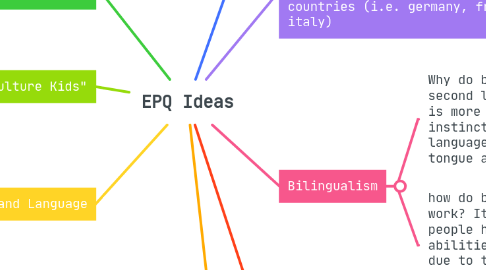EPQ Ideas
por Miriam Valente


1. Why do english people struggle to learn a modern language?
1.1. Is it because English has weaker links with other latin-based languages?
1.1.1. But this is untrue for children in mainland europe learning English - while they struggle with accent they still advance qickly with the language.
1.2. Is it because of a lack of motivation - the feeling that English is already universal enough that you don't need to know other languages.
1.3. Or is it the teaching methods? In other countries perhaps they start from an earlier age and use more literature and grammar as a basis for learning.
1.3.1. How methods of teaching like the website "language angels" are improving and accesibilising language teaching for teachers /making language learning worse and more standardised, boring.
2. "Third Culture Kids"
2.1. How TCKs form an identity
2.2. Literature from TCKs and how them being a TCK influences their writings: e.g. Andre Aciman or Jean Portante
3. France and Language
3.1. Are francophone countries settting a precedent with their language preservation policies?
4. Literature
4.1. Should we learn translated fiction in 'english' literature?
4.2. Cixous, De Beauvoir etc. - the french feminists and literary theory. - Why is france so progressive in this aspect: why are so many feminist icons french?
5. Comparing foreign language apprehension in switzerland vs other same language speaking countries (i.e. germany, france, italy)
5.1. Do swiss people learn foreign languages eaasier? Is this because they are more exposed to a wide range of languages in a country that is multilingual?
5.1.1. Is this because italian and french are both latin based and facilitate learning of latin-based langauges? But in this case what about German? - People in switzerland still lear it at a pretty quick rate
